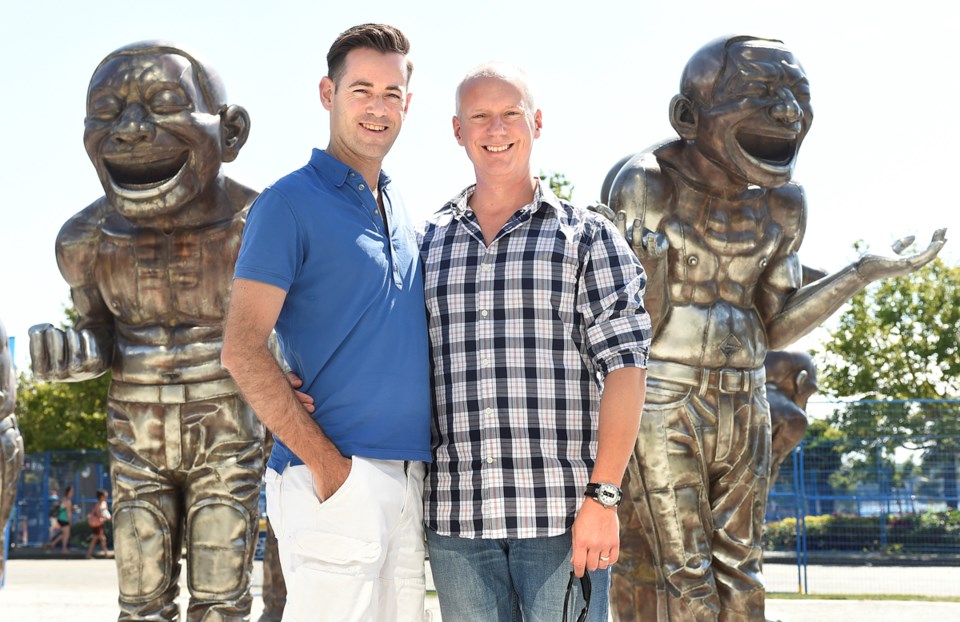After being publicly humiliated for “moral failure” in front of one of Canada’s largest mega-church congregations, Lonnie Delisle eventually abandoned the Christianity that had been central to his life.
“I went through a sort of angry phase,” he says. “If that was God, then no thanks, was my opinion.”
A professional musician, Delisle took a job on a cruise ship, for money and to figure out what to do next.
Unbeknownst to him, a young man he had met years earlier at an evangelical conference in South Africa was experiencing a similar disruption.
Hannes van der Merwe grew up on a remote sheep farm in South Africa’s Karoo, a sparsely populated semi-desert, the grandson of a Dutch Reformed minister.
Among the white population — Van der Merwe was 14 when apartheid ended in 1994 — the Dutch Reformed church permeated life and culture.
“Dutch Reform was all-pervasive throughout the nation,” he says, but it was even more so in his family.
Like many farm kids, he attended boarding school from Grade 1, but even though it was a public school, it was heavily imbued with Dutch Reformed theology, including private and public prayer times. In high school, young Hannes was chosen as chair of the Christian student movement and was deeply involved in the church. He recalls himself at that time as being “very earnest about my faith.”
His family thought — hoped — he might become a minister. Instead, he went to Cape Town to study graphic design, but carried with him his religious devotion.
“When I went to Cape Town, in my earnestness, I just started asking more questions,” he says. “I started reading my Bible a little more earnestly.”
His searching led him away from the Dutch Reformed church and into a Pentecostal one. It was mostly theological differences that led to the break, but in retrospect, he says, part of it came from his realization of how Dutch Reformed theology had underpinned the apartheid regime. His church-switching might seem a minor move to an outsider, but it was quite revolutionary for the time and place.
He joined a ministry that counselled people experiencing, as they called it, “relational and sexual brokenness.” This could involve adultery, pornography, sexual addictions or any number of mild to hard-core indicators. It also included homosexuality, which was invisible in Van der Merwe’s world.
“There were no gay people around to be seen,” he recalls. “It wasn’t talked about. It was so evil you will not find it close to us.”
He knows now that his interest in the ministry had as much to do with his own seeking as seeking to help others.
“Even though I realize I had kind of attractions to guys in late high school, I could never, never allow myself to believe that I am actually gay, that I’m attracted to guys,” he says. “There was this complete disconnect of what I felt and what I wanted to be. And what I wanted to be was this good Christian guy. I just wanted to make God happy, please people around me. I didn’t want to be perverse. I didn’t want to be bad.”
At one point, Van der Merwe decided to take a job as a photographer on a cruise ship. (No, this is not where the story converges.) There, the still-sheltered South African met hundreds of coworkers from around the world, people who became friends but whom, his theology told him, were going to hell because they had not accepted Jesus.
“But I loved them so much, I realized there is no way that God is going to send these people to hell,” he says. “So that’s where my faith started changing.”
He returned to South Africa, but not to church. He made diverse new friends, one of them was gay.
“We had so many discussions about faith and Christianity and sexuality,” he says. “Suddenly the penny dropped for me that I live my life according to what other people wanted me to be.”
People might reject him now, he understood, but he was confident God would not. He told his family and friends he was gay. And he remembered a man he had met at the Living Waters conference five years earlier.
He found Delisle on Facebook and told him of his journey. Their reconnection was powerful and instantaneous. On opposite sides of the globe, the two had undergone remarkably parallel evolutions. Things moved quickly, thanks partly to Skype. Delisle flew to South Africa for Christmas and their love was affirmed. Van der Merwe moved to Canada in 2012 and they were married later the same year.
Together, they have also found a spiritual community. Delisle is the music director at Canadian Memorial United Church as well as the Universal Gospel Choir, a multi-faith musical ensemble. Van der Merwe is in both choirs.
He admits that when he came to Canada, he was done with religion, as Delisle had been earlier. But they found a place, they say, of open hearts and open minds.
“I didn’t see the point in going to church anymore because if you want to be a Christian you have to believe in something in a specific way,” Van der Merwe says. The open theology he found at Canadian Memorial “was such a fresh breeze, a new way of thinking about faith.”
“I can ask questions,” he says. “I’m of the belief that the more perspectives are out there, the more you are open to, the more you listen to, the more you hear — what’s real and what matters will percolate from that.
“And that’s where I’m at.”
@Pat604Johnson



